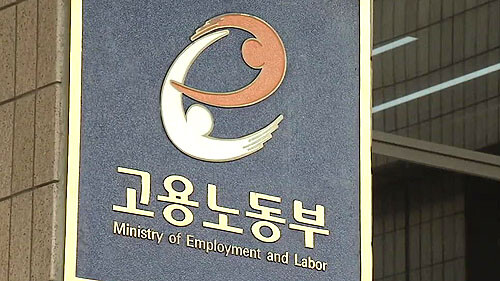hankyoreh
Links to other country sites 다른 나라 사이트 링크
Seeking ‘flexibility’, government intervening more in labor relations

The South Korean government has begun finding faults with collective agreements at large corporations. After mandating the relaxation of the requirements for changing the employment rules that determine the labor conditions at individual workplaces, the government is now intervening directly in collective agreements, prompting criticism that it is undermining the autonomy of labor and management relations as it pushes for a more flexible labor market.
On June 24, the Ministry of Employment and Labor released a study of collective agreements at the 30 South Korean corporations with the highest sales. The study found 11 companies (36.7%) with rules that give priority in hiring to the children of union members, 10 companies (33.3%) with rules providing for a single negotiating union, even though the law allows for multiple unions, and 14 companies (46.7%) that must receive the consent of labor unions for appointments and management decisions.
Concluding that the rules about priority in hiring and a single negotiating union are against the law, the Ministry announced that it will encourage management and labor at these companies to change these rules on their own by the end of August and officially order them to change them after that.
The government is pushing ahead with the correction of the collective agreements in the teeth of strong opposition from South Korea’s two biggest labor confederations - which lodged a complaint against the government at the general meeting of the International Labour Organization (ILO) in Geneva, Switzerland, on June 14 - possibly because it means to create popular opposition to labor unions.
For example, since companies have reportedly not hired many employees through their preferential hiring rules, it is unlikely that these rules have aggravated youth unemployment. Furthermore, even if the rules about single negotiating unions are a violation of mandatory provisions in the Trade Union and Labor Relations Adjustment Act, that doesn’t mean they actually prevent the establishment of multiple labor unions.
This is why some think that the government is using these trivial rules as an excuse to turn public opinion against labor unions that are thought to defend vested interests.
The Ministry also criticized the rules that require companies to receive union consent for appointments and management decisions as being unreasonable regulations that “weaken companies’ competitiveness.” But the issues that unions provide consent to typically concern key labor conditions such as relocating workers, outsourcing labor, layoffs, and voluntary retirement.
The Ministry’s behavior in this area is consistent with its recent announcement that, when companies change employment rules to implement the wage peak system, it would accept the validity of employment rules that had been changed without the consent of a majority of workers as long as they met six conditions of being reasonable according to social norms. The Ministry also intends to issue guidelines related to the conditions for normal dismissal of workers around August.
“The government’s plan to relax the conditions for making disadvantageous changes to employment rules will not stop with the wage peak system but will be extended to increasing flexibility in other working conditions. The government intends to complete its blueprint for labor market flexibility by eliminating collective agreements and other ways that unions can fight back,” said Jung Moon-ju, director of the Federation of Korean Trade Unions’ Policy Bureau.
“The Ministry of Employment and Labor is indicating that it will intervene any time it determines that a rule that labor and management have agreed upon independently is unreasonable, even while it refuses to negotiate with labor unions directly,” said Lim Sang-hun, business professor at Hanyang University and chair of the labor and society committee with People’s Solidarity for Participatory Democracy.
Lim’s comments hint at grave concerns that government efforts to create a more flexible labor market will encroach upon the autonomous domain of labor and management.
By Jeon Jong-hwi, staff reporter
Please direct questions or comments to [english@hani.co.kr]

Editorial・opinion
![[Editorial] Does Yoon think the Korean public is wrong? [Editorial] Does Yoon think the Korean public is wrong?](https://flexible.img.hani.co.kr/flexible/normal/500/300/imgdb/original/2024/0417/8517133419684774.jpg) [Editorial] Does Yoon think the Korean public is wrong?
[Editorial] Does Yoon think the Korean public is wrong?![[Editorial] As it bolsters its alliance with US, Japan must be accountable for past [Editorial] As it bolsters its alliance with US, Japan must be accountable for past](https://flexible.img.hani.co.kr/flexible/normal/500/300/imgdb/original/2024/0417/6817133413968321.jpg) [Editorial] As it bolsters its alliance with US, Japan must be accountable for past
[Editorial] As it bolsters its alliance with US, Japan must be accountable for past- [Guest essay] Amending the Constitution is Yoon’s key to leaving office in public’s good graces
- [Editorial] 10 years on, lessons of Sewol tragedy must never be forgotten
- [Column] A death blow to Korea’s prosecutor politics
- [Correspondent’s column] The US and the end of Japanese pacifism
- [Guest essay] How Korea turned its trainee doctors into monsters
- [Guest essay] As someone who helped forge Seoul-Moscow ties, their status today troubles me
- [Editorial] Koreans sent a loud and clear message to Yoon
- [Column] In Korea’s midterm elections, it’s time for accountability
Most viewed articles
- 1[Column] The clock is ticking for Korea’s first lady
- 2Samsung barricades office as unionized workers strike for better conditions
- 3[Editorial] When the choice is kids or career, Korea will never overcome birth rate woes
- 4[News analysis] After elections, prosecutorial reform will likely make legislative agenda
- 5S. Korea, Japan reaffirm commitment to strengthening trilateral ties with US
- 6Why Israel isn’t hitting Iran with immediate retaliation
- 7[Guest essay] How Korea turned its trainee doctors into monsters
- 8Japan officially says compensation of Korean forced laborers isn’t its responsibility
- 9[Editorial] Does Yoon think the Korean public is wrong?
- 10[Editorial] 10 years on, lessons of Sewol tragedy must never be forgotten